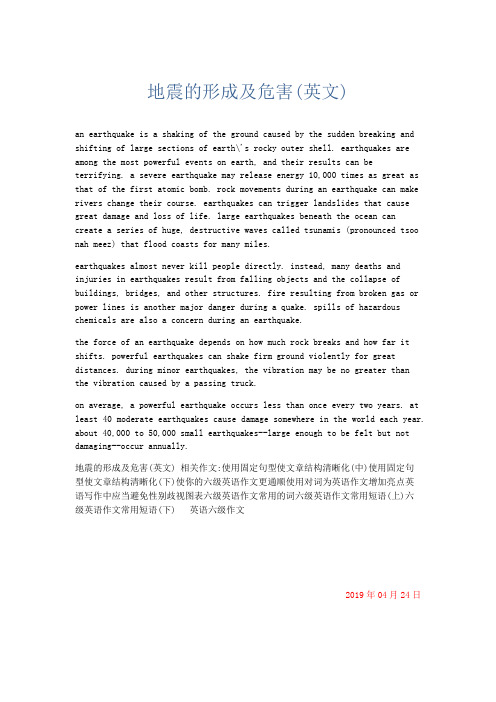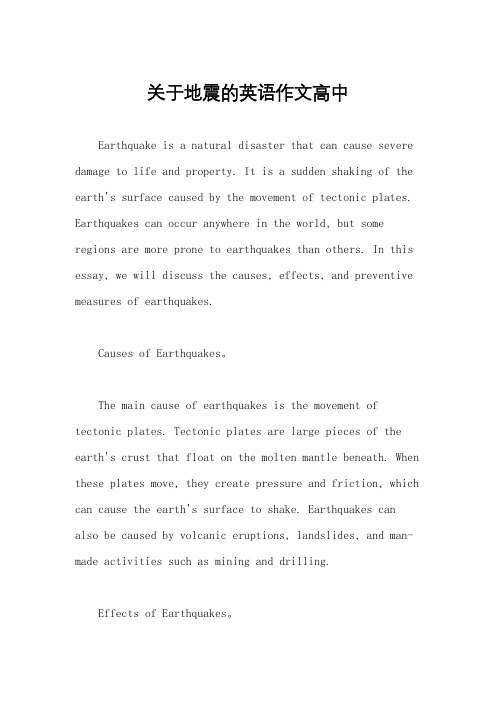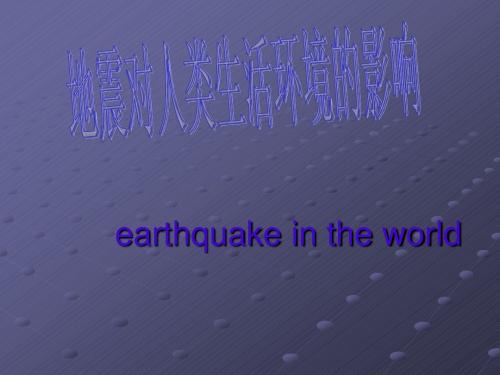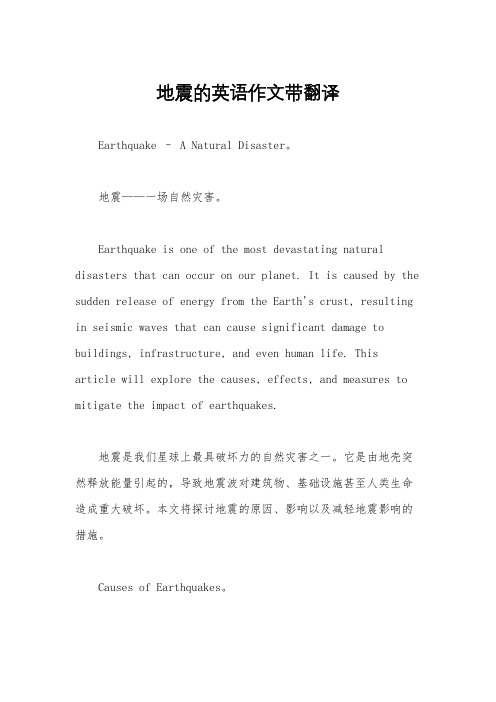地震的形成及危害(英文)
- 格式:doc
- 大小:15.00 KB
- 文档页数:2

地震的形成及危害(英文)an earthquake is a shaking of the ground caused by the sudden breaking and shifting of large sections of earth\'s rocky outer shell. earthquakes are among the most powerful events on earth, and their results can beterrifying. a severe earthquake may release energy 10,000 times as great as that of the first atomic bomb. rock movements during an earthquake can make rivers change their course. earthquakes can trigger landslides that cause great damage and loss of life. large earthquakes beneath the ocean cancreate a series of huge, destructive waves called tsunamis (pronounced tsoo nah meez) that flood coasts for many miles.earthquakes almost never kill people directly. instead, many deaths and injuries in earthquakes result from falling objects and the collapse of buildings, bridges, and other structures. fire resulting from broken gas or power lines is another major danger during a quake. spills of hazardous chemicals are also a concern during an earthquake.the force of an earthquake depends on how much rock breaks and how far it shifts. powerful earthquakes can shake firm ground violently for great distances. during minor earthquakes, the vibration may be no greater thanthe vibration caused by a passing truck.on average, a powerful earthquake occurs less than once every two years. at least 40 moderate earthquakes cause damage somewhere in the world each year. about 40,000 to 50,000 small earthquakes--large enough to be felt but not damaging--occur annually.地震的形成及危害(英文) 相关作文:使用固定句型使文章结构清晰化(中)使用固定句型使文章结构清晰化(下)使你的六级英语作文更通顺使用对词为英语作文增加亮点英语写作中应当避免性别歧视图表六级英语作文常用的词六级英语作文常用短语(上)六级英语作文常用短语(下) 英语六级作文2019年04月24日。

关于地震的英语作文高中Earthquake is a natural disaster that can cause severe damage to life and property. It is a sudden shaking of the earth's surface caused by the movement of tectonic plates. Earthquakes can occur anywhere in the world, but some regions are more prone to earthquakes than others. In this essay, we will discuss the causes, effects, and preventive measures of earthquakes.Causes of Earthquakes。
The main cause of earthquakes is the movement of tectonic plates. Tectonic plates are large pieces of the earth's crust that float on the molten mantle beneath. When these plates move, they create pressure and friction, which can cause the earth's surface to shake. Earthquakes can also be caused by volcanic eruptions, landslides, and man-made activities such as mining and drilling.Effects of Earthquakes。

地震的起因中英文介绍导语:地震又称地动、地振动,是地壳快速释放能量过程中造成振动,期间会产生地震波的一种自然现象。
地球上板块与板块之间相互挤压碰撞,造成板块边沿及板块内部产生错动和破裂,是引起地面震动(即地震)的主要原因.地震的起因英文介绍The causes of the earthquake 地震的起因The earthquake causes the Earth's surface vibration There are many reasons according to the causes of earthquakes, earthquakes can be divided into the following:引起地球表层振动的原因很多,根据地震的成因,可以把地震分为以下几种:1. Tectonic earthquakeSince the depths of underground rock dislocation, caused by the rupture of the earthquake known as tectonic earthquake. Such earthquake occurred most often, the greatest damage, the earthquake accounted for about 90 percent of the world over.1.构造地震由于地下深处岩层错动、破裂所造成的地震称为构造地震。
这类地震发生的次数最多,破坏力也最大,约占全世界地震的90%以上。
2. Volcanic earthquakeAs the volcano, such as magmatic activity, such as gas explosions caused by the earthquake known as the volcanic earthquake. Only in areas of volcanic activity may occur before the volcanic earthquakes, such earthquakes around the world accounts for only about 7 percent of the earthquake.2.火山地震由于火山作用,如岩浆活动、气体爆炸等引起的地震称为火山地震。

地震对人类带来危害的作文,英语英文回答:Earthquakes, a powerful force of nature, can have devastating consequences for human populations. The ground beneath our feet trembles, structures crumble, and livesare lost in an instant. The impact of earthquakes on human life can be profound, affecting physical, psychological,and socioeconomic well-being.Physical Impacts:Ground shaking: The shaking of the ground caused by the release of seismic energy can cause severe damage to buildings, bridges, and other infrastructure. It can leadto the collapse of structures, trapping and injuring people.Liquefaction: In areas with loose, water-saturated soil, earthquakes can cause liquefaction, where the soil losesits strength and becomes like quicksand. This can result inbuildings sinking, roads cracking, and even buried objects being ejected to the surface.Landslides and avalanches: Earthquakes can trigger landslides and avalanches in mountainous regions. These events can block roads, destroy infrastructure, and cause fatalities.Tsunamis: In coastal areas, earthquakes can generate devastating tsunamis, which are large ocean waves that can reach heights of over 30 meters. Tsunamis can cause widespread flooding, coastline erosion, and loss of life.Psychological Impacts:Trauma: Earthquakes can be extremely traumatic events, especially for people who have experienced loss or injury. The fear, helplessness, and anxiety associated with earthquakes can have lasting psychological effects, including post-traumatic stress disorder (PTSD).Stress and anxiety: The aftermath of an earthquake canbe highly stressful for survivors. The disruption of daily life, the loss of homes and loved ones, and the uncertainty about the future can create significant emotional distress.Disrupted sleep: The fear and anxiety following an earthquake can interfere with sleep, leading to insomnia, nightmares, and other sleep disturbances.Socioeconomic Impacts:Economic losses: Earthquakes can cause billions of dollars in economic losses due to the damage to infrastructure, homes, and businesses. The recovery and reconstruction process can be costly and time-consuming.Displaced populations: Severe earthquakes can displace large numbers of people, forcing them to leave their homes and seek temporary shelter. This can disrupt communities and strain resources.Loss of livelihoods: Earthquakes can damage or destroy workplaces, businesses, and farms, leading to job lossesand economic hardship.Increased healthcare needs: The injured and traumatized victims of earthquakes require extensive medical care,which can strain healthcare systems and divert resources from other essential needs.中文回答:地震对人类造成的危害。


地震的英语作文带翻译Earthquake – A Natural Disaster。
地震——一场自然灾害。
Earthquake is one of the most devastating natural disasters that can occur on our planet. It is caused by the sudden release of energy from the Earth's crust, resulting in seismic waves that can cause significant damage to buildings, infrastructure, and even human life. Thisarticle will explore the causes, effects, and measures to mitigate the impact of earthquakes.地震是我们星球上最具破坏力的自然灾害之一。
它是由地壳突然释放能量引起的,导致地震波对建筑物、基础设施甚至人类生命造成重大破坏。
本文将探讨地震的原因、影响以及减轻地震影响的措施。
Causes of Earthquakes。
地震的原因。
Earthquakes are caused by the movement of tectonic plates, which are large pieces of the Earth's crust that float on the molten mantle. When these plates move against each other, they create friction, which builds up pressure over time. When the pressure becomes too great, the plates suddenly shift, causing an earthquake.地震是由构造板块的运动引起的,构造板块是浮在熔融地幔上的大块地壳。
灾难有关的英文名词解释在我们的生活中,灾难是一种不可避免的现象,无论是自然灾害还是人为灾难。
为了更好地了解和理解这些灾难,以下是一些与灾难相关的英文名词解释。
1. Natural disasters(自然灾害)自然灾害是指由自然力量引发的灾难性事件,例如地震、火山喷发、飓风、洪水和干旱等。
这些灾难往往造成人员伤亡、财产损失和环境破坏。
2. Earthquake(地震)地震是地球内部能量释放的结果,导致地球表面产生震动。
地震通常由地壳移动和地震波引起,造成建筑物倒塌、土地裂缝和洪水等灾害。
3. Volcanic eruption(火山喷发)火山喷发指火山释放熔岩、烟尘和火山灰等物质到火山口或附近地区的过程。
火山喷发可以引发火山爆炸、火山喷发物降落和火山灰掩埋等灾难。
4. Hurricane(飓风)飓风是大规模旋转的气旋,形成于热带和亚热带海洋地区。
飓风伴随着强风、暴雨和洪水,可能造成房屋倒塌、道路破坏和电力中断。
5. Flood(洪水)洪水是水体从河流、湖泊或海洋中溢出,淹没周围地区的现象。
洪水常发生在降雨量过大、河流堤坝破裂或海平面上升等情况下,造成水灾和灾民流离失所。
6. Drought(干旱)干旱指长期缺乏雨水或水源的状态。
干旱可能导致农作物歉收、水资源匮乏和环境退化等严重后果,对农业、生态和经济造成威胁。
7. Man-made disasters(人为灾害)人为灾害是指由人类活动引起的灾难,例如工业事故、恐怖袭击和核能泄漏等。
这些灾难可能导致人员伤亡、环境破坏和经济损失。
8. Industrial accident(工业事故)工业事故是指在生产、加工或运输等工业活动中发生的事故。
工业事故可能导致化学泄漏、爆炸和火灾等,对工人和周围社区造成威胁。
9. Terrorism(恐怖主义)恐怖主义是一种通过使用暴力和恐吓手段来迫使政府或社会达到某种目标的行为。
恐怖主义活动可能导致人员伤亡、设施损毁和社会不安。
地震的危害英语作文Earthquakes are one of the most devastating natural disasters that can occur on our planet. They can strike without warning and cause widespread destruction and loss of life. The damage caused by earthquakes can be immense, and it is important to understand the risks associated with them in order to prepare and protect ourselves.One of the most obvious dangers of earthquakes is the damage they can cause to buildings and infrastructure. When the ground shakes, buildings can collapse, roads can crack and bridges can collapse. This can cause serious injury or death to those inside or around these structures. The damage to infrastructure can also lead to widespread power outages, water shortages and other disruptions to daily life.Another major danger of earthquakes is the risk of landslides and tsunamis. When the ground shakes, it can cause rocks and soil to shift, triggering landslides thatcan bury homes and roads. Tsunamis can also be triggered by earthquakes, causing massive waves that can flood coastal communities and cause widespread damage.Earthquakes can also have long-term effects on communities. They can cause psychological trauma, as people are forced to cope with the loss of loved ones, homes and possessions. The economic impact of earthquakes can also be significant, as businesses are disrupted and infrastructure is damaged. It can take years for communities to recover from the effects of a major earthquake.Despite the dangers of earthquakes, there are stepsthat can be taken to reduce the risk of injury and damage. Building codes can be enforced to ensure that structures are designed to withstand earthquakes, and emergency response plans can be put in place to help people evacuate safely and quickly. Education and awareness campaigns can also help people understand the risks and prepare for earthquakes.In conclusion, earthquakes are a serious threat tocommunities around the world. The damage they can cause can be devastating, but with proper preparation and awareness, we can reduce the risk of injury and damage. It is important to take earthquakes seriously and to take steps to protect ourselves and our communities.。
地震的产⽣earthquake 【概述】 地震(earthquake)就是地球表层的快速振动,在古代⼜称为地动。
它就象刮风、下⾬、闪电、⼭崩、⽕⼭爆发⼀样,是地球上经常发⽣的⼀种⾃然现象。
它发源于地下某⼀点,该点称为震源(focus)。
振动从震源传出,在地球中传播。
地⾯上离震源最近的⼀点称为震中,它是接受振动最早的部位。
⼤地振动是地震最直观、最普遍的表现。
在海底或滨海地区发⽣的强烈地震,能引起巨⼤的波浪,称为海啸。
地震是极其频繁的,全球每年发⽣地震约500万次,对整个社会有着很⼤的影响。
【地震的产⽣】 地震是地球内部介质局部发⽣急剧的破裂,产⽣地震波,从⽽在⼀定范围内引起地⾯振动的现象。
地震开始发⽣的地点称为震源,震源正上⽅的地⾯称为震中。
破坏性地震的地⾯振动最烈处称为极震区,极震区往往也就是震中所在的地区。
【地震现象】 地震发⽣时,最基本的现象是地⾯的连续振动,主要是明显的晃动。
极震区的⼈在感到⼤的晃动之前,有时⾸先感到上下跳动。
这是因为地震波从地内向地⾯传来,纵波⾸先到达的缘故。
横波接着产⽣⼤振幅的⽔平⽅向的晃动,是造成地震灾害的主要原因。
1960年智利⼤地震时,的晃动持续了3分钟。
地震造成的灾害⾸先是破坏房屋和构筑物,造成⼈畜的伤亡,如1976年中国河北唐⼭地震中,70%~80%的建筑物倒塌,⼈员伤亡惨重。
地震对⾃然界景观也有很⼤影响。
最主要的后果是地⾯出现断层和地裂缝。
⼤地震的地表断层常绵延⼏⼗⾄⼏百千⽶,往往具有较明显的垂直错距和⽔平错距,能反映出震源处的构造变动特征(见浓尾⼤地震,旧⾦⼭⼤地震)。
但并不是所有的地表断裂都直接与震源的运动相联系,它们也可能是由于地震波造成的次⽣影响。
特别是地表沉积层较厚的地区,坡地边缘、河岸和道路两旁常出现地裂缝,这往往是由于地形因素,在⼀侧没有依托的条件下晃动使表⼟松垮和崩裂。
地震的晃动使表⼟下沉,浅层的地下⽔受挤压会沿地裂缝上升⾄地表,形成喷沙冒⽔现象。
地震的形成及危害(英文)
地震的形成及危害(英文)地震的形成及危害(英文) an earthquake is a shaking of the ground caused by the sudden breaking and shifting of large sections of earth's rocky outer shell. earthquakes are among the most powerful events on earth, and their results can be terrifying. a severe earthquake may release energy 10,000 times as great as that of the first atomic bomb. rock movements during an earthquake can make rivers change their course. earthquakes can trigger landslides that cause great damage and loss of life. large earthquakes beneath the ocean can create a series of huge, destructive waves called tsunamis (pronounced tsoo nah meez) that flood coasts for many miles.
earthquakes almost never kill people directly. instead, many deaths and injuries in earthquakes result from falling objects and the collapse of buildings, bridges, and other structures. fire resulting from broken gas or power lines is another major danger during a quake. spills of hazardous chemicals are also a concern during an earthquake.
the force of an earthquake depends on how much rock
breaks and how far it shifts. powerful earthquakes can shake firm ground violently for great distances. during minor earthquakes, the vibration may be no greater than the vibration caused by a passing truck.
on average, a powerful earthquake occurs less than once every two years. at least 40 moderate earthquakes cause damage somewhere in the world each year. about 40,000 to 50,000 small earthquakes--large enough to be felt but not damaging--occur annually.。